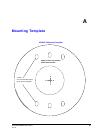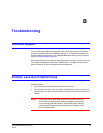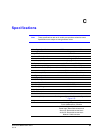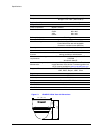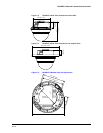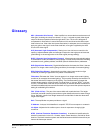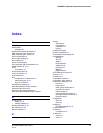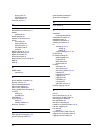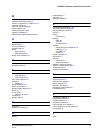
Document 800-04132V1 Rev A 73
01/10
D
Glossary
AGC (Automatic Gain Control) Video Amplifier in a camera that boosts the amount of
video gain (including the noise) to maintain a 1V p-p (1-volt peak-to-peak) video signal
output. It becomes operational when the light level is low. The circuit is designed to
compensate for fluctuations in scene illumination which would cause the video output
level to be too low. If the video level (scene illumination) is adequate, the circuit does not
apply any gain to the signal. As the video level falls, more gain is applied by the AGC
circuit to the video signal.
ALC (Automatic Light Compensation) Setting in an Auto Iris lens to control the iris
opening. Adjusts between peak and average to respond to the bright part of the scene
(peak setting) or the average value of the video signal (average setting).
DHCP (Dynamic Host Configuration Protocol) Allows a server to dynamically assign
IP addresses to nodes (workstations) automatically. Provides client information including
subnetwork mask, gateway address, and DNS (Domain Address Server) addresses.
DNR (Digital Noise Reduction) Digital Noise Reduction eliminates the “flicker” that can
appear in an image under certain lighting conditions (for example, fluorescent lighting).
DSS (Digital Slow Shutter) Automatically provides a clear image under low-light
conditions (increasing magnification may cause noise/distortion).
Flickerless Eliminates the “flicker” that can appear in an image under certain lighting
conditions (for example, fluorescent lighting). This is usually caused by the interaction of
the shutter with the AC frequency of the lighting. The flickerless setting changes the
camera shutter speed to a value that will not cause flicker (1/100 sec, NTSC, 1/120 sec
for PAL). The side effect is that the camera sensitivity is reduced because the electronic
iris feature has effectively been turned off and will no longer control the optimum exposure
setting for available light conditions.
FOV (Field of View) The part of the scene visible with a particular lens. The height
(horizontal) and width (vertical) picture size at a given distance that can be seen through
a lens. Generally, shorter focal length lenses have a wider field of view than those with
longer focal lengths.
Gain The amplification a system provides to a signal.
IP Address A unique, 32-bit identifier for a specific TCP/IP host computer on a network.
Iris Adjust Adjusts the iris to either open or close in response to changing light
conditions.
NTSC (National Television Standards Committee) A standard of specifications for
television transmission in the U.S., Canada, Japan, Central American, and half of South
America. The North American system uses interlaced scans and 525 horizontal lines per
frame at 30 frames per second.



